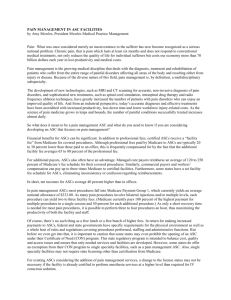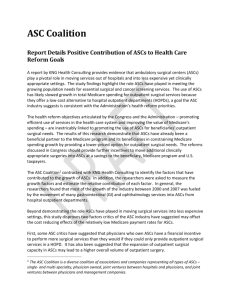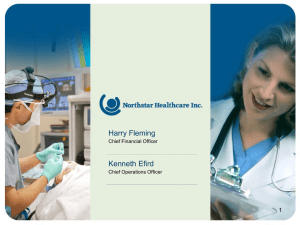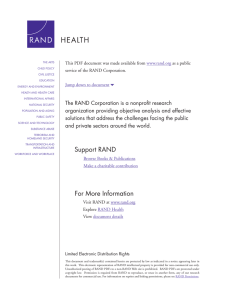Does Competition from Ambulatory Surgical Centers Affect Hospital
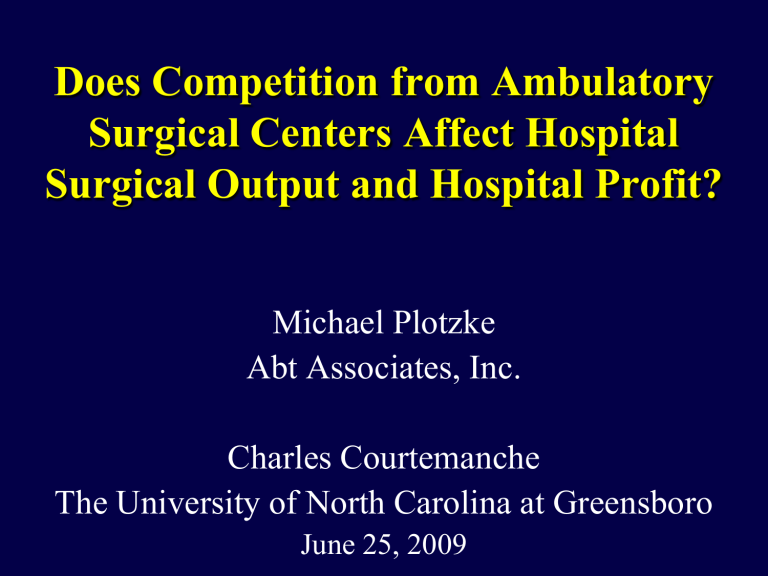
Does Competition from Ambulatory
Surgical Centers Affect Hospital
Surgical Output and Hospital Profit?
Michael Plotzke
Abt Associates, Inc.
Charles Courtemanche
The University of North Carolina at Greensboro
June 25, 2009
Introduction
• Ambulatory Surgery Center (ASC)
– Small health care facility offering only outpatient surgery
• Ophthalmology, Gastrointestinal, Orthopedics
– Low risk procedures
• Healthier patients
– Owned by the physicians who work there
• Extra income
Research Question
• Is the entry of ASCs associated with a reduction in a hospital’s provision of outpatient or inpatient surgery?
– Associated with a 2-4% decline in outpatient surgery
• Does the entry of ASCs into a hospital’s market impact a hospital’s profitability?
– No effect
Quotations
“Niche providers cherry pick the healthiest patients, leaving community hospitals to care for the sickest of the sick. Niche providers undercut the ability of hospitals to meet the needs of the broader community by drawing profitable services away from the community hospital.”
- Rick Pollack, American Hospital Association
Executive Vice President
Literature
• Effects of ASCs on Hospital Outpatient Surgery
– Lynk and Longley (2002)
– Bian and Morrisey (2007)
• Types of Patients treated at ASCs versus Hospitals
– Wynn et al. (2004)
– Winter (2003)
– Gabel (2008)
– Plotzke and Courtemanche (2009)
Data
• Centers for Medicare & Medicaid Services (CMS)
– Provider of Services File
– Medicare Cost Report
• American Hospital Association (AHA) Annual Survey
– Only include urban hospitals which are general or surgical.
• Variable Radius – 75% [Gresenz et al (2004)]
– Alternative market definitions
• MSA
• County
• Variable Radius – 90%
• Fixed Radius - 15 miles
Empirical Model
Y
it
=
β
0
+
β
1
ASC
1 it
−
1
+
β
2
CONTROLS
it
+
α
i
+
ω
t
+
ε
it
• Fixed Effects Estimator
– Observations represent a particular hospital during a particular year
• 1997 - 2004
– ASC1 , refers to the number of ASCs in the market of hospital i during year t-1.
• Dependent Variables
– Log of Annual Number of Outpatient Surgeries
– Log of Annual Number of Inpatient Surgeries
– Profit Margins (Outpatient and Inpatient)
Control Variables
• Measures of Hospital
Competition
– Number of other hospitals
– Herfindahl Hirschman index for patient admissions
• Hospital Characteristics
– Operating Rooms
– Full time physicians
– Less than 100 beds?
– Dummies for ownership
– Teaching Hospital
• Characteristics of the Hospital
Market
– Population (over 65)
– Population (total)
– Unemployment rate
– % living in Poverty
– Log of Median Income
Empirical Model
• Alternative Specification may be needed to examine the possibilities of omitted variable bias and reverse causality
– MSA-by-year effects
– Hospital specific linear time trends
– Lead of the number of ASCs
– Using lagged ASC presence as an instrument for current ASC presence
Heterogeneous Impacts
• The effect of ASCs on hospitals will depend on
ASC characteristics not accounted for in the baseline model
– Size (Number of Operating Rooms)
– Early Entry versus Late Entry
Figure 1 : Marginal Effect of Additional ASCs on ln(Outpatient Surgeries) –
Variable Radius
Dashed lines represent 95% confidence intervals.
Coefficient estimates and standard errors (in parentheses) for ASC variables:
ASCs -0.061 (0.008); ASCs 2 0.0012 (0.0002)
Conclusion
• ASC entry has an impact on the number of outpatient surgeries a hospital performs
• ASC entry has no impact on the profitability of a hospital
– Outpatient departments offer services beyond surgery
Questions?
Results
• Average hospital performs 5,614 outpatient surgeries per year.
– An entering ASC is associated with a reduction of about
180 surgeries. (3.2% Decline)
– Each hospital has an average of 2.2 ASCs (396 surgeries)
• ASC on average performs 3,494 outpatient surgeries
– On average, an ASC was located in 6.6 markets (634 surgeries)
• Results explain 18.1% of the surgeries ASCs perform
Hospital Margins
Medicare outpatient margin
=
(
Medicare outpatient charges Medicare outpatient
Medicare outpatient charges costs
)
• Problems with Margin Definition
– Charges, not revenues
– Charges may be proportional to revenues
• 2000 Outpatient Prospective Payment System
– Only Medicare patients
• But not for inpatient
Literature Review
• Entry by ASCs, and subsequent effects on hospitals, has barely been researched in the literature
– Literature only examines how hospitals influence hospitals
• ASCs and general hospitals
– Wynn et al (2004)
– Lynk and Longley (2002)
• Graph from “The Effect Of Physician-Owned Surgicenters
On Hospital Outpatient Surgery” by William J. Lynk and
Carina S. Longley [Health Affairs 2002 pg 216]
Quotations
“Many of our hospital chief financial officers and
CEOs have lamented the fact that the physicians cherry pick the easier cases and handle them in their privately owned centers, leaving the more complex and costly patients to the hospital”
- Sean Hopkins, New Jersey Hospital Association’s vice president of health economics
Quotations
• “ASCs are also more affordable for payors. Studies have shown that the Medicare program would pay approximately $464 million more per year if all procedures performed in an ASC were instead furnished at a hospital. Medicare saves almost half a billion dollars by utilizing ASCs instead of hospital outpatient departments.”
– American Association of Ambulatory Surgery Centers
Introduction
Why might ASC entry cause a hospital to reduce uncompensated care?
• Cross Subsidization
– Hospitals pay for uncompensated care using a portion of the revenue from their profitable patients
• Entry of ASCs
– Reduces market share of incumbent hospitals
Research Question
• Increased ASC presence could reduce healthcare expenditures
– Low Overhead and Specialized Services
– Lobbying groups and hospital administrators try to limit entry of “Niche” providers
• Lawsuits, Exclusive Contracts
• 18 Month Moratorium on Medicare payments to new
Specialty Hospitals
Introduction
• Costs of ASCs
– Physicians select profitable patients for their clinics and leave less profitable patients for the hospital
• Less uncompensated care
• Tax ASCs?
• Benefits of ASCs
– Nicer amenities
– Medicare reimburses at a lower rate
• ASCs have less overhead and a reduced cost of surgery
• Provide incentives for the construction of more ASCs?
